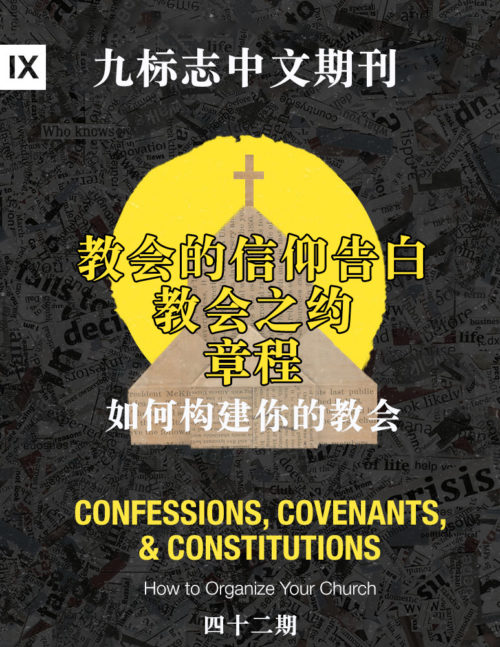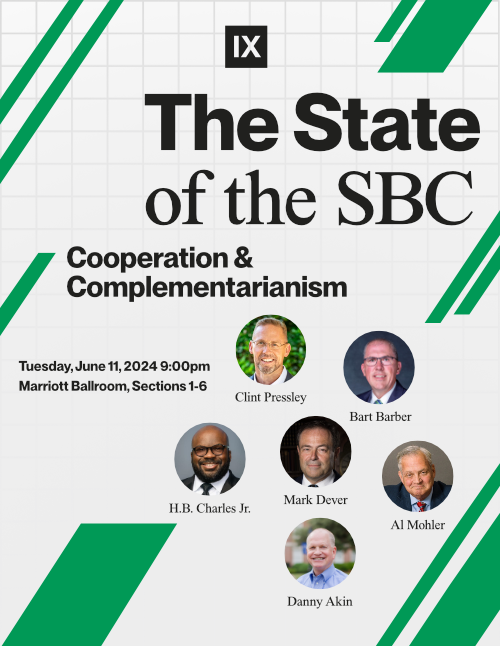
9Marks Journal: Confessions, Covenants, & Constitutions (42期:教会的信仰告白、教会之约和章程:如何构建你的教会)
How to Organize Your Church
“Scripture is the only document our church needs!” Have you ever thought that? Okay, fine. But I have a few questions for you. First, who exactly would you say Jesus is, and can I get baptized in your church if I, like, totally disagree with you on his divinity? Also, is it okay for me to call myself a member of your church and—you know—never, ever attend? And—last question—who in your church, generally speaking, decides who the pastors are? I mean, does the church just kinda know? The Spirit tells them? Or, maybe, you personally speak for the Spirit! Yes, Scripture should be a church’s sole authority. But the confessions, covenants, and constitutions of a church articulate what the members agree the Scripture teaches on what they should believe, how they should live, and how they should be governed. Church documents are a prosaic topic, to be sure. But they facilitate unity. They protect a church from being governed by the passions of the moment. And they force a congregation and its leaders to be careful, deliberate, reflective, and, hopefully, biblical. Not bad, for a boring old administrator’s job. To put it another way, church documents are kind. It is kind to tell people what you think up front. It is kind say what you will expect from them or how disagreements will be resolved. Imagine a husband and wife, a year into marriage, realizing they have dramatically different views about commitment and faithfulness because they never bothered with vows. “Ah, that’s just paperwork!” Or, imagine your boss asking you to do one thing when you thought your job was something else because you never had a job description. This is what church documents are for—letting everyone know what their job is, and what covenant faithfulness looks like. Believe it or not, we at 9Marks get questions about church documents perhaps as much as any other topic. And my guess is that a lot of our pastor-readers are not surprised. They know how crucial good documents are. For reasons like these, we offer this edition of the 9Marks Journal to help you think through different aspects of confessions, covenants, and constitutions, as well as a couple of other documents. If you have follow up questions, try the 9Marks Mailbag, or just ask an older, wiser pastor! We pray this is useful.
“圣经是我们教会需要的唯一文件!”你曾这样想过吗?
好吧。但是我有一些问题问你。首先,你认为耶稣是谁?如果我完全不认同耶稣的神性,我可以在你的教会受洗吗?
或者,我称自己是你教会的成员,但是你知道,我从来不参加主日,这样可以吗?
最后一个问题:一般来说,在你的教会由谁来决定牧师人选?我是说,教会是否还满确定的?圣灵告诉他们的吗?或者,也许是你个人替圣灵代言而已!
是的,圣经应该是教会唯一的权威。但是信仰告白、教会之约和章程表明教会成员所认信的应当持守的圣经教训、他们应该如何生活以及如何治理教会。
教会文件肯定是很乏味的话题。但是它们促进合一。它们保护教会免于感情用事的治理。它们也促使会众和领袖谨慎、深思熟虑、自省、常存盼望以及合乎圣经。对于一份枯燥老旧的行政人员工作而言,这并不算糟。
另一方面说,教会文件是有益处的。它可以告诉人们你最看重的东西。它也帮助他人了解你对他们的期待,或者分歧如何得到解决。
想象一对夫妻刚进入婚姻一年,意识到他们在有关委身与忠心的认识上有显著的不同,因为他们之前从来没有为誓约而费过神。“啊,哪只不过是一纸文件而已!”或者,想象一下你的上司要你做一件事,而你却以为你的工作是做别的,原因竟然是你从来没有职责说明。
这也是教会文件存在的原因:让每个人了解他们的职责所在,以及忠于盟约的含义。
信不信由你,九标志事工收到的有关教会文件的问题可能和其它话题一样多。我猜我们中间许多的牧师读者对此并不会感到惊讶。他们知道好的教会文件有多么重要。
基于这个原因,我们奉上本期期刊,帮助你思考信仰告白、教会之约和章程以及其它一些文件的不同方面。如果你有进一步的疑问,可以搜索九标志中文网站的九标志问答,或者你可以咨询一位更年长有智慧的牧者!我们祷告这些资源对你有用。





